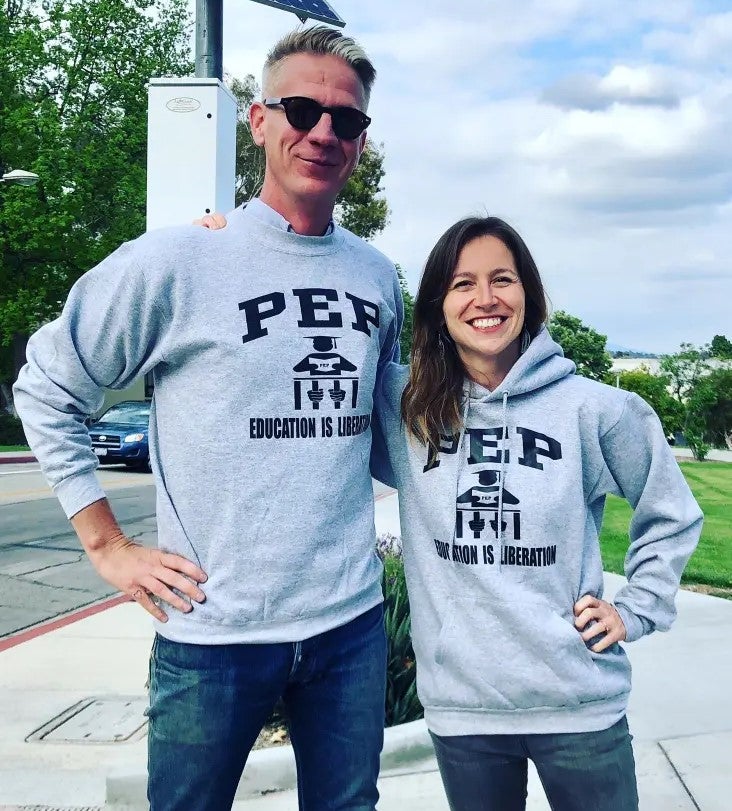
USC Prison Education Project
A Community for All
Universities can bring enormous benefits to a community, but Nik De Dominic says one group often misses out — those in prison.
De Dominic, associate professor (teaching) of writing at the USC Dornsife College of Letters, Arts and Sciences, says that when it comes to leveraging the resources of the university to benefit the greater community, incarcerated populations are often forgotten members.
To address this oversight, he co-founded and co-directs USC’s Prison Education Project (PEP) with Assistant Professor (Teaching) of Writing Kate Levin. PEP aims to “facilitate connections that transcend walls both literal and figurative,” creating a prison-to-school pipeline that transforms program participants as well as society.
“We do this by bringing classes to currently incarcerated people, offering editing services to incarcerated writers, and by hosting artists, activists, academics and community members to foster critical conversations on incarceration for our campus,” De Dominic said.
USC Prison Education Project helps prevent a return to crime and prison
According to the Bureau of Justice Statistics, incarcerated individuals who participate in postsecondary prison education are 43% less likely to return to prison than those who don’t. Additionally, education programs provide employment opportunities and smoother reentry into society upon release,
With the help of donor support, USC PEP has harnessed the power of a world-class university to offer educational opportunities to incarcerated individuals across California.
Founded at USC Dornsife in 2017 in collaboration with Cal Poly Pomona’s Prison Education Project, USC PEP serves students in custody with regular course offerings at multiple correctional and transitional living facilities. Course offerings taught by USC faculty include classes in film, astronomy, speculative fiction, screenwriting, and debate.
Through these classes, as well as Writing 320 — a USC Dornsife Writing Program course that co-enrolls USC students and students at the California Institution for Women — USC PEP publishes student written works in print anthologies.
USC’s chapter is the largest in the nationwide Prison Education Project, with the most volunteer instructors, TAs and classes. More than 60 student and faculty members participate every semester, engaging over 100 incarcerated students through coursework, contests and editorial mentorship.
Donors empower USC PEP to help incarcerated writers
As the size and scope of the program has grown, so has the need for donor support to sustain it. De Dominic listed some of the ways donor gifts support a variety of USC PEP needs:
- Transporting USC students to and from the facility
- Postage, materials and communication costs for the USC PEP Readers’ Circle editing program
- Cash awards for the writers’ contest
- Annual anthologies of USC and incarcerated writers’ work
- Credit and processing costs associated with the class itself
- Community events
- Honoraria for campus speaker series
Glen Sato and Hope Nakamura are among the donors who have supported USC PEP, seeing it as a means to bring about change in the lives of both USC students and those who are incarcerated.
“We believe that the incarcerated population is more talented and capable than stereotypes might offer,” Sato said. “The ability of undergraduates to experience those talents should be part of the educational process.”
USC faculty, staff and students, who know firsthand the power of a USC education, have also rallied to support USC PEP. Katherine Chan Guevarra, a Master of Public Administration student at the USC Sol Price School of Public Policy and a staff graduate advisor for the Comparative Studies in Literature and Culture Doctoral Program, discovered USC PEP through Keziah Poole.
A USC Dornsife alumna who earned her PhD through the CLSC program in 2021, Poole is founder and co-director of The USC PEP Readers’ Circle, which provides typing, editing and proofreading services for USC PEP writers. Poole’s passion for the USC PEP program inspired Guevarra to provide a financial gift.
“Both incarcerated students and USC students will find something of value in this experience, whether it be meeting someone they may not have met otherwise, expanding their communication skills, or finding shared interests in literature with a wide community,” Guevarra said.
Another USC PEP donor and current USC student, who wished to remain anonymous, cited that sense of connection and discovery as motivation for her gift to the program. “My hope is that individuals in the PEP program will learn about the common humanity and depth of human experience through stories and experiences shared, as well as a stronger understanding of the challenges that perpetuate disparities within prison systems,” she said.
The benefits of supporting USC PEP extend to broader society
Beyond financial support, there are a number of ways individuals can contribute to the program, such as by attending PEP-sponsored community discussions about issues related to mass incarceration or reading for the annual PEP essay contest.
Another popular method for support is through participation in The USC Reader’s Circle, which connects volunteer editors — including students, faculty and staff — with incarcerated writers. Through the program, incarcerated authors, playwrights, screenwriters and poets receive supportive feedback aimed at encouraging their creative growth.
At its heart, the USC PEP program and those who support it seek to encourage thoughtful exchange within and between diverse communities and, according to Sato, “increase the welfare of society as a whole.”
With so many ways for individuals to contribute, USC PEP affords opportunities to generate change in individuals themselves and across society.
“When the general public thinks of philanthropy, which is to promote the welfare of others, we typically don’t think that we as individuals can fill such a large role,” Guevarra said. “Yet, we all have the ability to help others in small but meaningful ways.”
Connect With Us
USC Dornsife Office of Advancement
1150 South Olive Street, Suite 2400
Los Angeles, CA 90015
Mail Checks to:
USC Advancement Gift Services
1150 South Olive Street, Suite 2500
Los Angeles, California 90015
USC Tax ID: 95-1642394
